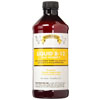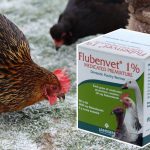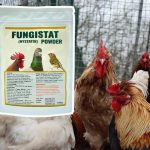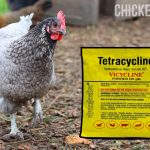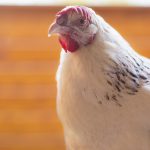Vitamin B12 for Chickens
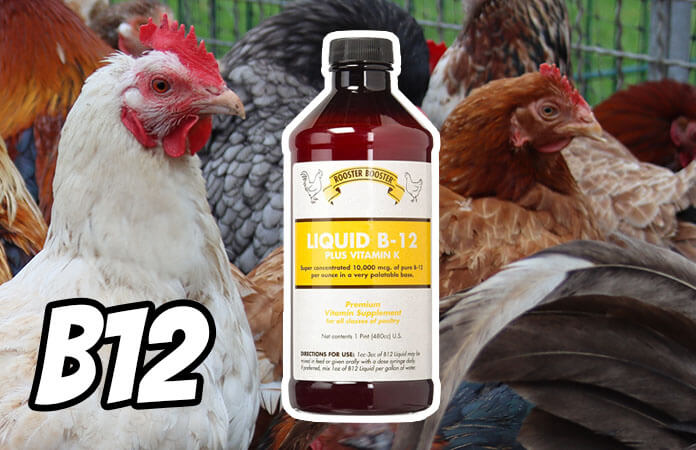

Chicken Fans is reader-supported. When you buy through our links, we may earn a commission. Learn more about our privacy policy and disclaimer.
Vitamin B12 is an essential vitamin for chickens that plays a core role in many vital body processes. However, vitamin B12 is not found in plant-based foods, and a chicken’s body can’t synthesize enough B12 in itself for optimal health.
Supplementation can be essential if you’re not feeding your chickens with fortified foods or in case of medical conditions.
- Health Benefits of Vitamin B12 for Chickens
- Vitamin B12 Doses & Requirements For Chickens
- Vitamin B12 Deficiency in Chickens
- When to Supplement Vitamin B12 to Chickens?
- What Is So Specific About Vitamin B12?
- Supplementing Vitamin B12 in Chicken Feed for Vegans
- Vitamin B12 for Egg Layers
- Vitamin B12 for Meat Chickens
- Rooster Booster Vitamin B12 Supplement
- Can Chickens Get an Overdose of Vitamin B12?
If you are just looking for the supplement, here is the product we’ll discuss later:
- Mix 1 ounce per gallon of water daily. You can also give 1 mL to 3 mL, which may be mixed in feed or administered orally with a dose syringe.
Let’s dig deep into the benefits and risks of B12 and why chickens need it.
Health Benefits of Vitamin B12 for Chickens
Vitamin B12 is a water-soluble vitamin among the vitamin B-complexes, which plays a critical role in a chicken’s growth, development, and overall health. It serves as a coenzyme to support the normal functioning of the nervous system, red blood cell formation, and DNA synthesis.
Adequate intake of Vitamin B12 through their diet or supplementation can improve a chicken’s growth, development, and embryo formation, enhance egg production and feather quality, prevent skeletal diseases like perosis, and enhance their immune functions. It can also interact well with other vitamins like Vitamin E, folate, and Vitamin B6 to achieve optimal health and performance in chickens.
Vitamin B12 Doses & Requirements For Chickens
In general, optimal vitamin B12 doses differ depending on the type of chicken and its age.
The following table gives the optimal vitamin B12 doses for several types of chickens in different life stages:
| Type | Age | Optimal |
|---|---|---|
| Chick | 0-10 weeks | 0.02-0.04 mg/kg |
| Growing | 10-20 weeks | 0.02-0.03 mg/kg |
| Laying Hen | 20+ | 0.015-0.025 mg/kg |
| Broiler / Meat Chicken | 20+ | 0.02-0.03 mg/kg |
| Roosters | 10+ | 0.02-0.03 mg/kg |
| ISA Brown Chick | 0-10 weeks | 0.02 mg/kg |
| ISA Brown Rearing | 10-2% lay | 0.01 mg/kg |
| ISA Brown Laying | Laying Period | 0.015 mg/kg |
| Hy-Line Rearing | 10-2% lay | 0.023 mg/kg |
| Hy-Line Production | Laying Period | 0.023 mg/kg |
| Lohman LSL | Starter/ Grower | 0.02 mg/kg |
| Lohman LSL | Layer | 0.025 mg/kg |
If you use the Rooster Booster B12 supplement, you can give 1 mL to 3 mL, which may be mixed in feed or administered orally with a dose syringe. You can also mix 1 ounce per gallon of water daily.
Vitamin B12 Deficiency in Chickens
Vitamin B12 is essential in proper amino acid utilization in poultry. Amino acids are the building blocks of proteins used to build different body tissues and for other metabolic functions, such as improving immune and gut functions.
Symptoms of a Vitamin B12 deficiency in chickens include:
- Vitamin B12 Deficiency in Growing Chicks
- increased mortality
- reduced weight gain and feed intake
- poor feathering
- enlarged thyroid glands
- gizzard lesions
- nervous disorders
- Vitamin B12 deficiency in laying hens
- Production of smaller-sized eggs
- decrease in egg weight
- Vitamin B12 deficiency in breeders
- Decrease hatchability
- Vitamin B12 deficiency in developing embryos from Vit. B12-deficient breeders
- Edema
- Hemorrhages
- Beak shortening
- Myotrophy of legs and perosis
- Fattiness of the liver, heart, and kidneys
- Fewer myelinated fibers in the spinal cord
- high incidence of embryonic death at 17 days of incubation
Although several concerns can be seen in vitamin B12-deficient chickens, the occurrence can still be considered highly unlikely or rare if they are regularly fed a complete diet or grown on litter where animal-based ingredients are used.
When to Supplement Vitamin B12 to Chickens?
In the following situations, it can help to supplement B12 to chickens:
- After periods of malnutrition
- Digestive issues, diarrhea
- Anemia and weakness
- Nervous disorders
- Feathering issues
- Perosis
Generally, chickens can synthesize vitamin B12 from diet and microbial synthesis using cobalt inside the GI tract, particularly in the cecum. However, small levels of digestive concerns can result in poor absorption, and then vitamin B12 must be supplemented.
Feeding chickens with a complete diet or supplementing Vitamin B12 in the following conditions can greatly improve their performance and efficiency:
- Anemia and weakness: Anemia is a condition wherein the body does not have enough red blood cells to transport oxygen which may result in weakness. Vitamin B12 is involved in forming hemoglobin, which transports oxygen to body cells and red blood cells. Lack of Vitamin B12 in the diet or failure to supplement this can lead to such conditions.
- Perosis: Perosis is a skeletal disorder that refers to defective leg and bone formation and is commonly seen in battery-fed chickens. This can be considered a secondary effect of a lack of vitamin B12 in the diet since it directly interacts with the amino acid methionine, which influences skeletal muscle growth and overall bone development.
What Is So Specific About Vitamin B12?
Vitamin B is an essential nutrient composed of eight water-soluble vitamins, also known as vitamin B-complexes. These are widely distributed in different foods and function as coenzymes, ensuring that the body’s cells function properly.
One of the important members of the vitamin B complex is vitamin B12, the only vitamin containing a metallic element, namely cobalt. That’s why it is also referred to as cobalamin. There are four types of vitamin B12: cyanocobalamin, hydroxocobalamin, adenosylcobalamin, and methylcobalamin, with cyanocobalamin being the most common and most stable.
Generally, vitamin B12 acts as a coenzyme in different body processes. It mainly aids in the building of genetic material, the production of normal red blood cells, and the maintenance of the nervous system. It is bound to transcobalamin in the plasma so that it can be stored in large quantities in the liver and slowly released as needed. Chicks have the ability to store excess vitamin B12 in their liver, kidney, and pancreas.
Supplementing Vitamin B12 in Chicken Feed for Vegans
Unlike any other food, vitamin B12 is not present in plants, and vegans should be conscious of their intake of this specific vitamin. A vitamin B12 deficiency in humans can also cause anemia, neurological problems, and even developmental delays in children.
Eggs produced from chickens with enough vitamin B12 can, in a way, help vegans have a significant source of vitamin B12 aside from other fortified foods and supplements. However, the level of vitamin B12 present in eggs, particularly in egg yolks, may vary depending on its level in the chicken diet and how it is given. The presence of vitamin B12 is markedly higher in chickens injected with vitamin B12 than in those fed.
Vitamin B12 for Egg Layers
Vitamin B12 is essential for laying chickens, which can play a crucial role in maintaining their health, productivity, and efficiency. Adding this vitamin to the diet of those B12-deficient hens can help them achieve optimal egg production, egg weight, and body weight.
Its greatest concentration can be found in the yolk, where normal eggs were found to contain much higher levels of vitamin B12 than eggs from hens fed a diet deficient in this vitamin. That’s why egg vitamin B12 content can also be used to predict problems in the vitamin B12 status of laying and breeding flocks.
Egg yolk concentrations of vitamin B12 can respond rapidly to dietary changes in the level of this vitamin and are indicative of the vitamin B12 status of the hen. When there’s a vitamin B12 deficiency, it can reduce egg vitamin content quickly.
For breeders, it can significantly improve the hatchability and subsequent livability and growth of chicks. Studies showed that maximum egg production, egg weight, hen weight, and hatchability were obtained when the diet contained 8.0 mg/kg of vitamin B12. Adding this vitamin to other nutrients can also yield positive results like increasing egg weight; however, exceeding the recommended levels of vitamin B12 too much can also cause a decrease in shell thickness.
Vitamin B12 for Meat Chickens
Vitamin B12 is necessary for chick growth and development, particularly in converting their feed into body weight more efficiently. As a cofactor of protein and amino acid synthesis, particularly methionine, it has a crucial biochemical reaction in fat and protein metabolism. It can also help increase the efficiency of some amino acids used in synthesizing Vitamin B12, which is metabolized through propionate to yield energy.
However, sometimes supplemental Vitamin B12 has little to no significant effect on ADG, ADFI, and FCR but can improve hematological parameters such as white blood cells, red blood cells, their indices, and platelet counts to help boost the immune system and protect against infections and diseases.
Rooster Booster Vitamin B12 Supplement
Rooster Booster is a super concentrated 10,000 mcg per ounce of pure B-12, which can help multiple species in times of stress due to illness, aid in stimulating appetite for proper growth, oxygenate the blood, and increase alertness.
- Mix 1 ounce per gallon of water daily. You can also give 1 mL to 3 mL, which may be mixed in feed or administered orally with a dose syringe.
In administering this product to your flock, you can give 1 mL to 3 mL, which may be mixed in feed or administered orally with a dose syringe. You can also mix 1 ounce per gallon of water daily.
Aside from the plain Vitamin B12, there’s also another product with Vitamin K.
Vitamin K is needed to activate several clotting factors in the liver to prevent blood loss from injuries, trauma, or bleeding. While Vitamins B12 and K do not interact with each other, both can still work together to play a vital role in the growth, health, and performance of chickens. With Vitamin B12 responsible for maintaining and improving hematological parameters, Vitamin K ensures that no excessive blood loss may occur.
Can Chickens Get an Overdose of Vitamin B12?
As one of the water-soluble vitamins, excessive intake of Vitamin B12 is generally not a concern but still possible for poultry to experience. However, this is rare and can only be seen in chickens fed with an excessive dose. This condition can also be referred to as hypervitaminosis B12.
When chickens are given a very high dose of vitamin B12, it might interfere with the normal absorption and metabolism of other nutrients, which can result in weight loss, poor feathering, and a negative impact on immune function as well.
In laying chickens, if there’s an increase in Vitamin B12 over what’s needed, there’s an observed decrease in shell thickness and egg weight. In addition, excess vitamin B12 that is not absorbed in the intestine can change the gut microbiome composition and may cause an overgrowth of intestinal bacteria.

Dr. E. Rivera is a licensed veterinarian specializing in poultry and backyard chickens. She monitors different commercial broiler and layer farms and devises medication, vaccination, and biosecurity programs.
Related Articles
- Rooster Booster Poultry Cell: a broad spectrum vitamin, mineral, and amino acid supplement to boost chicken health when under stress
- Rooster Booster Vitamins & Electrolytes with Lactobacillus: a vitamin and electrolyte supplement that also contains probiotics
- Calcium for Chickens: Calcium is essential for chickens as it’s vital for egg production, controls heart rate and blood clotting, promotes a healthy nervous system, supports growth and development, boosts bone strength, activates digestive enzymes, and regulates the body’s pH.
- Probiotics for Chickens: probiotics are natural supplements with live microorganisms found in the chicken’s digestive system. They promote a healthy gut, boost the immune system, egg laying, and prevent viral and bacterial diseases.
- Vitamin K for Chickens: vitamin K is a group of 3 chemicals essential for blood clotting, biosynthesis of proteins, bone composition, and embryo development in chickens and poultry.
- Vitamin D for Chickens: Vitamin D is essential for chickens, especially laying hens and chicks. It supports skeleton development and proper immune functioning.
References
- Squires, MW and Naber, EC. 1992. Vitamin Profiles of Eggs as Indicators of Nutritional Status in the Laying Hen: Vitamin B12 Study.Poultry Science 71:2075-2082
- Kato, RK et. al., 2002. Cobalt and Vitamin B12 in Diets for Commercial Laying
- Hens on the Second Cycle of Production. Brazilian Journal of Poultry Science. ISSN 1516-635X
- Dersjant‐Li, Y. and Peisker, M. 2011. A Review on Recent Findings on Amino Acids Requirements in Poultry Studies. Iranian Journal of Applied Animal Science (2011) 1(2), 73 79
- Kahn, Cynthia, et. al. 2010. The Merck Veterinary Manual. 10th Edition. Merck and Co., Inc. Whitehouse Station, N.J., U.S.A.
- Khan S, Chaudhry AS, Anjum FM, et al. Hypervitaminosis B12 in commercial broiler chickens. Journal of Animal and Plant Sciences. 2012;22(2):308-312.
- Clifford, J. and Curely, J. 2019. Water-Soluble Vitamins: B-Complex and Vitamin C – 9.312. Colorado State University Extension.
- Ahmad, Zaheer, Ming Xie, Yongbao Wu, and Shuisheng Hou. 2019. “Effect of Supplemental Cyanocobalamin on the Growth Performance and Hematological Indicators of the White Pekin Ducks from Hatch to Day 21” Animals 9, no. 9: 633. https://doi.org/10.3390/ani9090633
- Baggerman, J.O., et. al. 2021. Effects of Encapsulated Methionine on Skeletal Muscle Growth and Development and Subsequent Feedlot Performance and Carcass Characteristics in Beef Steers. National Library of Medicine. National Center for Biotechnology Information. doi: 10.3390/ani11061627
- Denton, C.A., et. al. 1954. Effect of Injecting and Feeding Vitamin B12 to Hens on Content of the Vitamin in the Egg and Blood: One Figure. The Journal of Nutrition, Volume 54, Issue 4, December 1954, Pages 571–577, https://doi.org/10.1093/jn/54.4.571
- Halick, J.V. 1953. The Vitamin B12 Content of Egg Yolks as Influenced by Oral and Parenteral Administration of the Vitamin: Two Figures. The Journal of Nutrition, Volume 50, Issue 3, July 1953, Pages 331–340, https://doi.org/10.1093/jn/50.3.331
- National Academy of Sciences. 1994. Nutrient Requirements of Poultry. Ninth Edition. National Academy Press Washington, D.C.
- Patel, M.B. and McGinnis, J. 1976. The Effect of Levels of Protein and Vitamin B12 in Hen Diets on Egg Production and Hatchability of Eggs and on Livability and Growth of Chicks. Department of Animal Sciences, Washington State University, Pullman, Washington 99163
- Wang R, Bai Y, Yang Y, Wu X, Li R. A Comparison of Production Performance, Egg Quality, and Cecal Microbiota in Laying Hens Receiving Graded Levels of Vitamin B12. Front Vet Sci. 2021 Oct 21;8:712183. doi: 10.3389/fvets.2021.712183. PMID: 34746275; PMCID: PMC8566728.
